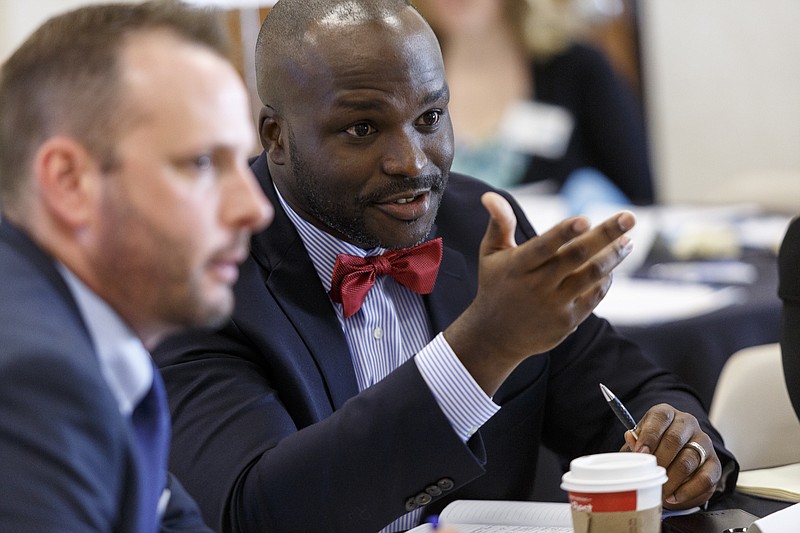The future of education has arrived in Hamilton County.
It's not a moment too soon.
Starting this fall, rising freshmen students in Hamilton County will have the opportunity to enroll in one of 17 school-within-a-school settings in 11 high schools that can help align them for success in future careers.
"We have evolved as a society," Superintendent Dr. Bryan Johnson told editors and reporters at the Times Free Press Thursday. "Education has to change."
Future Ready Institutes will allow students, beginning in ninth grade, to lean into career fields - from aviation to web design - that interest them. And while their new learning communities will concentrate on specific career themes, their core content areas of English, math, science and social studies will be taught through the lens of those themes.
The hope is that the high school career focus will be the impetus for students to earn certifications, two- or four-year college degrees, or advanced degrees in the same or similar fields, thus increasing their eventual value to the workforce and their potential earning power.
The initiative is a result of the nontraditional thinking we hoped would come from the confluence of a new superintendent and the work of Chattanooga 2.0, which has sought to create a new education and workforce strategy for all Hamilton County students.
Before Johnson's arrival, the district had begun a handful of new programs to reach a limited number of students but generally seemed stuck on what the superintendent referred to in another context as a "desks in a row" strategy.
The 17 career institutes will have a goal of 100 students apiece, at least 25 percent from outside the zone in which the career institute is located.
Transportation will be a key component in the success of the Future Ready Institutes, and district officials admit that issue is a work in progress. They hope to have much of the problem worked out by the beginning of the 2018-2019 school year but say it could take a little longer.
The initiative will be implemented without a significant outlay of district funds, though teachers will be shifted both from within schools and from without. The implementation comes, in part, from contributions by business and industry partners such as JP Morgan Chase, Unum, Erlanger Health System, EPB and others, which are motivated by the need for a trained workforce.
Christy Gillenwater, president and CEO of the Greater Chattanooga Chamber of Commerce, said the need for a trained workforce is a national problem. In the past, business and industry just expected schools would "produce what we need," she said. "We never had that dialogue" about what was needed, "but we can't expect educators to read our mind."
With Future Ready Institutes, she said, "we have a chance to be a national model for collaborative partnerships."
Hamilton County already has career academies at several high schools, but the new model is like the old version on steroids. It's similar to models already being implemented in Nashville and Clarksville, where Johnson previously served as chief academic officer.
What the superintendent learned from those models, he said, is that students who enroll in career and technical education academies both outperform their peers and have higher rates of graduation.
Those facts alone are enough to warrant the implementation of Future Ready Institutes in Hamilton County, which has seen a stubborn lack of academic progress, especially in its high poverty schools.
But they offer more. They offer students the opportunity to learn with like-minded classmates in a smaller setting about a field in which they already have an interest. Further, they offer them hands-on learning, real-world problem-solving, college credits and exposure to experiences they would never have in a traditional classroom.
They offer the possibility of "getting excited about learning," said Dr. Steven Angle, chancellor of the University of Tennessee at Chattanooga. "When learning's fun, the sky's the limit."
Future Ready Institutes also helps push Hamilton County toward Johnson's goal of more individualized education.
"We're looking at every student," he said, asking them "what do you have the potential to be."
The message to students through Future Ready Institutes, said Dr. Nakia Towns Edwards, chief of staff for the district, should be "you can get anywhere from here."
"This," said Dr. Jared Bigham, executive director of Chattanooga 2.0, "is a the biggest initiative in three decades for Hamilton County Schools. "This is unlike any of the work that's been done before."
We hope the community, especially parents, students and potential business partners, will accept this unprecedented opportunity for what it is.
"It's going to make a difference in our community," Angle said.
